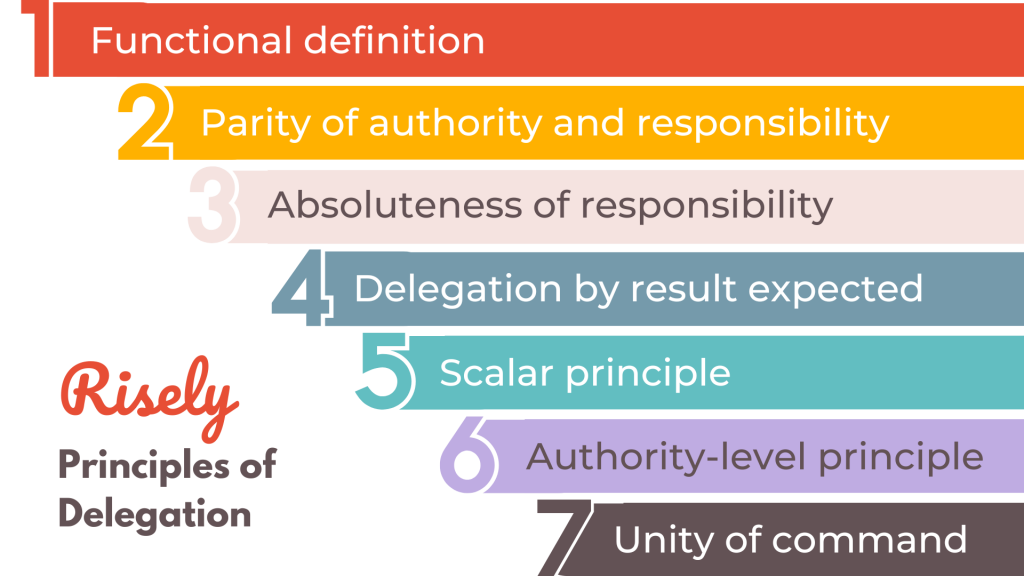Top 7 Principles of Delegation that Managers Need
As you would know, delegation is a crucial part of effective leadership and management, and it simply means assigning tasks and responsibilities to others to achieve a common goal. But is it actually that simple to practice? Not really! Many managers and leaders struggle with this essential skill of leadership. When done correctly, delegation leads to increased efficiency and productivity, as well as improved team morale and development. However, delegation is also challenging, requires trust, communication, and clear expectations. In this blog, we will explore this skill in detail and have a look at the essential principles of delegation that will help you in becoming better at delegating. Whether you are a new or an old manager, understanding and mastering the art of delegation can significantly impact your success and your team’s success. Through the examples, you will learn to delegate tasks and responsibilities in your professional life effectively.What is Delegation? And Why is it Important?
Effective delegation is assigning tasks and responsibilities to others, typically to team members or subordinates, to achieve a common goal. It involves transferring authority and decision-making power to others to get work done. Delegation is essential in the workplace for several reasons:- Improved efficiency: By delegating tasks and responsibilities, managers can focus on high-level tasks and strategies rather than getting distracted by easy tasks. It can lead to increased efficiency and productivity.
- Team development: Delegating tasks and responsibilities can help team members develop new skills and grow in their careers. It allows individuals to take on new challenges and responsibilities, which can lead to personal and professional growth.
- Improved morale: When team members feel trusted and valued, it can increase job satisfaction and confidence. Delegating tasks and responsibilities can demonstrate trust in an employee’s abilities and help them feel more invested in the team’s success.
- Increased capacity: Delegation can help organizations take on more work and achieve goals by distributing tasks and responsibilities among team members.
What are Delegation Skills?
Delegation skills are essential for every manager. They allow you to delegate tasks without feeling overwhelmed or stressed out. It can be imperative when working with teams and groups of people. Setting expectations and communicating clearly with team members is the key to effective delegation. When done correctly, delegation can lead to a more efficient work environment and increased productivity.5 Essential Delegation Skills For Managers
Effective delegation is a crucial skill for managers to develop to achieve success and drive results in their team. Here are five delegation skills that every manager should cultivate:Effective communication
Effective communication is a crucial skill for successful delegation. It involves not only providing clear instructions and expectations for tasks and responsibilities but also listening to and understanding the needs and concerns of team members. Some specific communication skills that are important for effective delegation include:- Active listening
- Clear and concise communication
- Adaptive communication
Time management
Effective time management involves prioritizing tasks and allocating appropriate amounts of time for each delegation, and being efficient and productive in using time. Some specific time management skills that are important for effective delegation include:- Prioritization
- Resource allocation
- Scheduling
- Time estimation
Giving feedback
Giving Constructive feedback allows managers to delegate work effectively and focus on other tasks while allowing the team member to improve their skills. The best way to give effective feedback is by considering the individual’s strengths and weaknesses. This way, they can learn from the experience instead of getting frustrated or defensive. Providing feedback is an essential aspect of effective delegation, as it allows team members to understand how they are doing and what they can do to improve. Here are some tips for providing effective feedback as part of the delegation process:- Be specific: Provide specific examples of what the team member did well or areas for improvement.
- Be timely: Provide feedback as soon as possible after the task or project is completed. It will allow team members to incorporate any needed changes and improve their performance on future projects.
- Be objective: Focus on the work rather than the individual’s personality or character.
- Be open to discussion: Encourage team members to ask questions and provide them with perspectives on the feedback. It can foster open communication and collaboration.
- Provide resources: If there are areas for improvement, provide resources or support to help team members improve their skills and performance.
Problem Solving
Effective problem-solving is essential for managers to develop and succeed in their teams. Regarding delegation, problem-solving skills can be instrumental in addressing any challenges that may arise during the process. Here is an overview of the problem solving process that you can utilize at your workplace:- Identify the problem
- Generate potential solutions
- Evaluate and choose the best solution
- Implement and monitor the solution
- Reflect and learn
Analytical skills
Analytical skills are all about gathering, organizing, and interpreting data and information to solve problems or make decisions. These skills are essential for effective delegation, as they can help managers to assess the feasibility and potential impact of different tasks and responsibilities. Some specific analytical skills that can be useful in the delegation process include:- Data analysis is gathering and organizing data in a meaningful way to make informed decisions.
- Critical thinking is evaluating arguments and evidence to make logical and informed decisions.
- Decision-making is the ability to weigh the pros and cons of different options and make decisions based on logical reasoning.
Other Interesting Reads
7 Principles of Delegation In Management
The 7 principles of delegation are a set of guidelines for effective delegation in the workplace. They provide a framework for managers to follow when assigning tasks and responsibilities to team members.The principle of functional definition
The functional definition principles of delegation, also known as the principle of precise definition, is a guideline that clearly defines the tasks and responsibilities being delegated. It includes setting clear expectations for the desired outcomes, deadlines, and necessary resources or support. By clearly defining the delegated tasks and responsibilities, managers can ensure that team members understand their roles and expectations. As a result, it can reduce confusion and ambiguity, leading to better results and increased efficiency.The principle of unity of command
The principle of delegation unity of command is a guideline that ensures that team members receive clear and consistent direction from a single manager. This principle is based on the idea that team members only have to answer to one person to avoid confusion and conflicting instructions.The principle of delegation by result expected
The principle of delegation by result expected is a guideline for an effective delegation that involves assigning tasks and responsibilities based on the desired outcomes or results. This principle is based on the idea that leaders and managers should focus on the results they want to achieve rather than the specific tasks and processes used to achieve those results. By following this principle of delegation leaders and managers can allow team members to use their judgment and decision-making skills to determine the best way to complete a task or achieve a result. In addition, it can lead to increased innovation and creativity within the team and build trust and empowerment among team members.The principle of absoluteness of responsibility
The principle of absoluteness of responsibility is a guideline that involves transferring complete authority and responsibility for a task or project to a team member. This principle is based on the idea that team members should be fully responsible and accountable for their assigned work and have the necessary autonomy and decision-making power to complete the task effectively. By following this principle of delegation leaders and managers can empower team members to take ownership of their work and make decisions that align with the organization’s goals. In addition, it can lead to increased motivation and job satisfaction among team members and help build trust and collaboration within the team.The principle of parity of authority and responsibility
The principle of parity of authority and responsibility is a guideline for an effective delegation that involves ensuring that team members have the necessary control and commitment to complete the assigned tasks. This principle of delegation is based on the idea that team members should have the required autonomy and decision-making power to complete tasks and that they should be held accountable for the results of their work. By following this principle of delegation, managers can ensure that team members have the necessary resources and support to complete tasks effectively and are held accountable for their work. In addition, it can lead to increased efficiency within the team and help build trust and empowerment among team members.The authority-level principle
The authority level principle is a guideline for an effective delegation that involves assigning tasks and responsibilities based on the authority level of the team member. This principle of delegation is based on the idea that team members should be given duties and responsibilities that are appropriate for their level of authority and experience. By following this principle of delegation leaders and managers can ensure that team members have the necessary skills, knowledge, and resources to complete tasks effectively and are adequately utilized.The scalar principle
The scalar principle is a guideline for an effective delegation that involves assigning tasks and responsibilities based on the organization’s hierarchical structure. This principle of delegation is based on the idea that roles and responsibilities should flow from higher to lower levels, following a transparent chain of command. By following the scalar principle of delegation leaders and managers can ensure that tasks and responsibilities are being delegated to the appropriate team level and that there is a clear line of communication and decision-making. In addition, it can help to build collaboration within the team.
Conclusion
Delegation is delegating tasks or responsibilities to other employees, a skill that seems quite easy to practice but has its own challenges. It is an essential skill for managers and leaders like you, as it allows you to delegate tasks efficiently even if they are outside your area of expertise. By understanding the different types of delegation and the necessary skills to carry out each type, you can delegate tasks effectively and efficiently. Make sure to practice these principles of delegation so that you can delegate tasks with confidence!Take the free Effective Delegation self-assessment now!
Test your delegation skills today to understand what is keeping you behind.
Principles of Delegation FAQs
What are the basic principles of delegation?
Delegation is the process of assigning tasks, responsibilities, and authority from a manager or leader to a subordinate. It empowers employees, fosters their growth, and allows managers to focus on higher-level tasks.
What is delegation and principles of delegation?
Authority: Grant the necessary authority to the delegate to accomplish the assigned task effectively.
Responsibility: Clearly define the tasks, objectives, and outcomes, making the delegate responsible for the results.
Clarity: Ensure clear and unambiguous communication of expectations, deadlines, and resources.
Competence: Delegate tasks to individuals with the appropriate skills and knowledge for successful execution.
Accountability: Hold the delegate accountable for their actions and outcomes, fostering ownership and commitment.
Monitoring: Regularly follow up and provide support, but avoid micromanaging to allow autonomy.
Feedback: Provide constructive feedback and recognize achievements to encourage growth and improvement.
Results-Oriented: Focus on the results and outcomes rather than prescribing specific methods.
Responsibility: Clearly define the tasks, objectives, and outcomes, making the delegate responsible for the results.
Clarity: Ensure clear and unambiguous communication of expectations, deadlines, and resources.
Competence: Delegate tasks to individuals with the appropriate skills and knowledge for successful execution.
Accountability: Hold the delegate accountable for their actions and outcomes, fostering ownership and commitment.
Monitoring: Regularly follow up and provide support, but avoid micromanaging to allow autonomy.
Feedback: Provide constructive feedback and recognize achievements to encourage growth and improvement.
Results-Oriented: Focus on the results and outcomes rather than prescribing specific methods.
How many principles of delegation are there?
There are seven basic principles of delegation. These principles provide a framework for effective delegation and successful task execution within organizations.
Other Related Blogs
5 Frameworks to Master Prioritization Skills
5 Frameworks to Master Prioritization Skills Ever feel like your to-do list has morphed into a never-ending monster, overflowing with tasks and projects all vying for your attention? You’re not…
10 Successful Workplace Delegation Examples for Managers
10 Successful Workplace Delegation Examples for Managers Managers often find themselves stuck amidst huge workloads – delegation shows the way out! It can be effective when it involves a team…
8 Problems of Delegation that Hold You Back: How to Overcome Them?
8 Problems of Delegation that Hold You Back: How to Overcome Them? What is one of the most critical and challenging parts of the managerial role? I think every manager…
Mastering 5 Levels of Delegation: The Key to Managerial Success
Mastering 5 Levels of Delegation: The Key to Managerial Success Picture this: your to-do list is a monstrous beast, overflowing with tasks and threatening to topple you over. You know…


